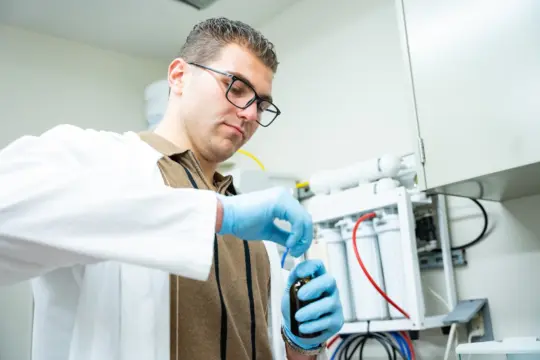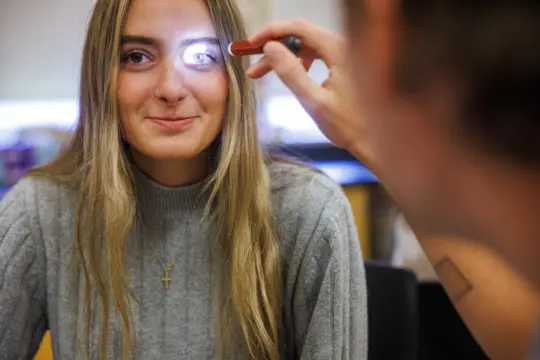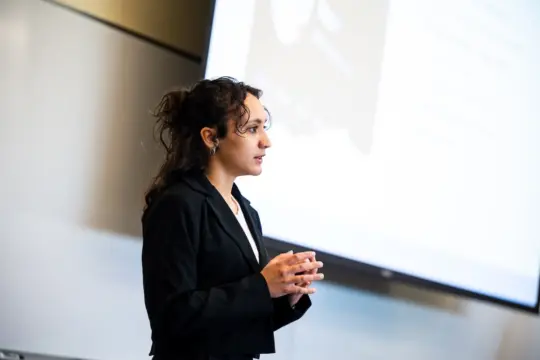
Psychology Degree
As an undergrad, you will have the rare opportunity to attend and present at professional conferences, where you will interact with leading researchers in the field. Presenting your research sets you apart from your peers. Students also gain real-world experience during a personally curated practicum while being mentored by a Susquehanna University professor. This is invaluable experience for those who want to become social workers, therapists, clinicians and researchers.
Are you curious about the decisions people make and why? Do you find the intricacies of relationships endlessly fascinating? Can you see yourself as a researcher or clinician studying human behavior or behavioral health? Do you look at organizations and think there’s a better way for people to interact?
If so, consider majoring in psychology at Susquehanna, where our students have a track record of success in multiple career paths. They are consistently accepted into the best graduate and professional schools in the world. Each student in our program works with a faculty member and completes an original research project, providing experience and skills that are key to landing a job or getting into graduate school.
FUTURE READY
Experienced faculty members guide students in hands-on research, career exploration and supportive learning environments. Through this major, students will build the skills needed to thrive in any career.

SUsquehanna By the Numbers
More Than Metrics
100%
of students complete an original research project as part of their capstone experience
22
community partners providing experiential learning opportunities
Where Passion Meets Purpose
Straight from the Nest




“My major has prepared me for my future career by providing a much better understanding of human behavior and enhancing my self-awareness. The GO program further developed my cultural sensitivity and personal conscientiousness during my study abroad trip.”
— Eve Morris ’24
“I would describe the community at Susquehanna as very welcoming, very inclusive and like a giant family.”
— Lys Maurer ’26
“As a junior, when I started my job, it was an incredible opportunity I don’t think I would have gotten anywhere else because it’s just so unheard of. The thing is, it’s not unheard of at Susquehanna, because everyone I know has a similar story. When you leave Susquehanna, you’ve already made all the connections you need for your post-grad life.”
— Arabella Cox ’25
“When students commit to Susquehanna, they gain so much, including small class sizes, one-on-one help from professors, an open and diverse climate, illuminating school spirit, challenging academics, the GO program, friendly staff, and President Green and first lady Ms. Lynn Buck’s genuine love for the university and its students.”
— Sydney Mastropasqua ’23
Explore Your Studies
Program Resources
A Glance Into Your Degree Pathway
With support from advisors and course planning tools, your time at Susquehanna is carefully designed to help you succeed. This example provides a glimpse into your degree experience, but you’ll have plenty of opportunities to customize your path with electives or study abroad programs that reflect your passions and career goals.
Methods in collecting, organizing, summarizing, analyzing and interpreting numerical data. Topics include organizing data in table and graph formats; measures of central tendency, dispersion, relative standing, and correlation; probability; and hypothesis testing. Students may earn credit for only one of the introductory statistics courses offered by the departments of Management, Psychology and Mathematical Sciences. 4 SH. CC: Analytical Thought.
Psychology
Choose from a variety of elective courses within this program to customize your goals.
Basic research methods. Covers naturalistic observation, surveys, and experimental and quasi-experimental designs. Lecture and lab. Prerequisites: Sophomore standing, PSYC-101, and a statistics class (PSYC-123, BIOL/ECOL-220 or MATH-180.) 4 SH. CC: Writing Intensive.
Psychology
Choose from a variety of elective courses within this program to customize your goals.
Psychology
Choose from a variety of elective courses within this program to customize your goals.
Psychology
Choose from a variety of elective courses within this program to customize your goals.
Psychology
Choose from a variety of elective courses within this program to customize your goals.
Psychology
Choose from a variety of elective courses within this program to customize your goals.
Student/faculty collaborative research in the student’s area of interest. Introduces the methodologies and problems of doing original research in psychology. Lecture and lab. Prerequisites: PSYC-223 and instructor’s permission. 4 SH. Capstone. CC: Writing Intensive, Team Intensive.
Psychology
Choose from a variety of elective courses within this program to customize your goals.
Psychology
Choose from a variety of elective courses within this program to customize your goals.
Introduces principles and theories of behavior. Topics include biopsychology, sensation and perception, learning and memory, and physical and behavioral development. Also covers personality theory and assessment, social and cultural influences on behavior, and behavior pathology and treatment. 4 SH. CC: Social Interactions.
Methods in collecting, organizing, summarizing, analyzing and interpreting numerical data. Topics include organizing data in table and graph formats; measures of central tendency, dispersion, relative standing, and correlation; probability; and hypothesis testing. Students may earn credit for only one of the introductory statistics courses offered by the departments of Management, Psychology and Mathematical Sciences. 4 SH. CC: Analytical Thought.
Examines selected topics in psychology, depending on student and instructor interest. Course may be repeated for credit if topic is different. Prerequisite: PSYC-101. 2-4 SH.
Basic research methods. Covers naturalistic observation, surveys, and experimental and quasi-experimental designs. Lecture and lab. Prerequisites: Sophomore standing, PSYC-101, and a statistics class (PSYC-123, BIOL/ECOL-220 or MATH-180.) 4 SH. CC: Writing Intensive.
The study of how individuals are influenced by social interactions. Examines social phenomena, such as attitude change, conformity, impression formation, stereotyping, aggression and helping. Emphasizes scientific methods and results, explanatory theories and applications to practical problems. Prerequisite: PSYC-101. 4 SH.
The study of how people interact with the environment – both natural and built. Topics covered include environmental perception and cognition; worldviews and attitudes toward nature; impact of environmental factors such as weather, on behavior and mood; reactions to natural and technological disasters; personal space, territoriality, and crowding; and psychological factors in urban planning and in residential, educational, and commercial design. Prerequisite: PSYC-101. 4 SH.
Human development during conception, infancy, toddlerhood, childhood, adolescence, adult years, and death. Emphasizes development and behavioral changes in the biological, cognitive and social cognitive domains. Includes physical, emotional, identity, relationships, and moral development. Examines culture as a context for development and behavior. Students may not receive credit for both PSYC-237 and PSYC-238. Prerequisite: PSYC-101. 4SH.
Human development during conception, infancy, toddlerhood, childhood, and adolescence. Emphasizes development and behavioral changes in the biological, cognitive and social cognitive domains. Includes physical, cognitive, emotional, self-concept, pubertal, intellectual, and moral development. Examines culture as a context for development and behavior. Students may not receive credit for both PSYC 238 and PSYC 237. Prerequisite: PSYC-101. 4SH.
Human development from the adult years through death. Emphasizes development and behavioral changes in the biological, cognitive and social cognitive domains. Includes physical and hormonal changes, intelligence, emotions, communication, career and retirement issues, family changes, relationships and marriage, and death and dying. Examines culture as a context for development and behavior. Prerequisite: PSYC-101. 4 SH.
Reviews important topics in this field, from both the psychological and bio-medical perspective. Topics covered include stress and its management, health-related decision-making, chronic disease and the involvement of psychosocial factors in medical care settings. Emphasis is placed on evaluating the impact of these areas upon everyday life and in clinical settings. Prerequisite: PSYC-101 and sophomore standing. 4 SH. CC: Interdisciplinary.
Examines the physiological and psychological effects of a wide variety of legal and illegal drugs as well as patterns of drug use. Includes behavioral, pharmacological and neurological points of view. Stresses factual and unbiased information which is presented in a non-judgmental fashion. Prerequisite: PSYC-101. 4 SH.
Covers major theoretical perspectives on personality structure and development, with an emphasis on supporting research and practical applications. Prerequisite: PSYC-101. 4 SH.
Examines the causes, symptoms and treatment of mental disorders. Also addresses theoretical perspectives, research methodology, the diagnostic process, assessment procedures, and ethical issues associated with the field. Prerequisite: PSYC-101 and sophomore standing. 4 SH.
Introduces the development, characteristics and use of psychological tests. Covers methods of constructing, administering and evaluating tests. Reviews tests of abilities, personality, interest and attitudes. Also explores technical problems and ethical issues common in psychological testing. Prerequisites: PSYC-101 and either PSYC-123 or MATH-180. 4 SH.
Continues and expands topics introduced in PSYC-123 Statistics for Behavioral Sciences. Emphasizes the design and analysis of multifactor experiments. Examines designs,including completely randomized, randomized block and split-plot factorial designs. Also covers Latin and Greco-Latin square designs and covariance designs. Prerequisites: PSYC-101, PSYC-223, and statistics. 4 SH.
Explores current theory and research in the development of gender and consequences of gender roles. Covers evolutionary, biological, psychoanalytic, cognitive, social learning, and cross-cultural perspectives on gender, as well as approaches that seek to understand interactions among these influences. Prerequisite: Sophomore standing and either PSYC-101 or SOCI-101. Same as WGST-334. 4 SH. CC: Diversity, Writing Intensive.
An examination of how the mind works through the mental process underlying attention, perception, memory, language, reasoning, and decision-making, on both behavioral and physiological levels. Prerequisite: PSYC-101. 4 SH.
Explores neurophysiological influences on behavior. Topics may include human communication, learning and memory, visual processing, ingestive behavior, sleep, emotion and stress, addiction, aggression, reproductive behavior, and neurological and neuropsychological disorders. Prerequisite: Sophomore standing and PSYC-101. 4 SH, CC: Interdisciplinary.
Examines principles and theories of classical and instrumental conditioning, including the roles of contiguity and contingency, reinforcement, cognitive and behavioral models of classical conditioning and instrumental learning, and factors influencing learning. Prerequisite: PSYC-101. 4 SH.
Explores how individuals take in information from the environment and interpret it meaningfully. Focuses on the visual and auditory systems, but also covers olfaction, taste, and touch. Covers the anatomy of human sensory systems and the neural and cognitive processes that turn sensations into perceptions of the world. Prerequisite: PSYC-101. 4 SH.
Examines how humans learn, represent, comprehend, and produce language. Focuses on research methodology, language acquisition, comprehension and production, neural representation of language, and language disorders. Prerequisites: PSYC:101 and sophomore standing or permission of the instructor. 4 SH. CC: Interdisciplinary.
A critical examination of the role of culture in human development and behavior. Explores: (a) the universality and diversity of human biological, cognitive, social, and emotional development and behavior within and across racial, ethnic, and cultural groups, (b) the contexts in which multiple cultures intersect or interact with one another and the historical, institutional, and personal factors that influence or regulate these interactions, and (c) the theoretical and methodological approaches psychologists use to explore these issues. Prerequisite: Junior standing and either PSYC-101 or SOCI-101. 4 SH. CC: Diversity, Writing Intensive.
Using behavioral neuroscience methods and procedures to investigate action potential dynamics, neuroanatomy, visual processing, learning and memory processes, and emotion regulation. Prerequisite: PSYC-223, PSYC-342 to be taken concurrently or as a prerequisite. 1 SH.
Investigates cognitive phenomena including attention, memory, and problem-solving, using appropriate experimental methodology and techniques. Prerequisite: PSYC-223, PSYC-340 to be taken currently or as a prerequisite. 1 SH.
This course provides an experience with the experimental methods employed in the study of learning. The course utilizes laboratory techniques to examine the principles and theories of classical and instrumental conditioning. Prerequisite: PSYC-223, PSYC-344 to be taken concurrently or as a prerequisite. 1 SH.
Accompanies PSYC-346 Sensation and Perception. Provides direct experience with this topic area through participation in perception studies, collection and analysis of data, and reading and discussion of relevant source literature. Prerequisite: PSYC-223, PSYC-346 to be taken concurrently or as a prerequisite. 1 SH.
Examines selected advanced topics in psychology, depending on student and instructor interest. Course may be repeated for credit if topic is different. Prerequisite: Any 200-level or higher psychology course and junior or senior standing. 2-4 SH.
Student/faculty collaborative research in the student’s area of interest. Introduces the methodologies and problems of doing original research in psychology. Lecture and lab. Prerequisites: PSYC-223 and instructor’s permission. 4 SH. Capstone. CC: Writing Intensive, Team Intensive.
An introduction to professional psychotherapy and its major theoretical underpinnings. Includes basic helping skills, selected intervention techniques, issues in treating special client populations, and professional ethics. Prerequisites: PSYC-320 and junior standing. 4 SH. CC: Ethics Intensive.
Practical experience in an approved work setting. The student is responsible for arranging the internship and completing a learning contract with the faculty supervisor. May be repeated once for a maximum of 6 SH. 2-4 SH.
Provides student with the opportunity to collaborate on a faculty research project as part of a close mentoring relationship where students learn advanced research methods and data management in a one-on-one setting. Involves a commitment of 5 hours per week per SH of course credit. Open only to students who meet criteria set by supervisor and only when positions are available. May be taken multiple times to a total of 4 SH. Prerequisite: Faculty supervisor’s permission. 1-4 SH.
Provides an opportunity to work individually with the instructor for focused reading, study, and reflection about a particular topic area. Prerequisite: Instructor’s permission. 1-4 SH.
Students complete an individual research project in their area of interest working closely with a faculty supervisor. Prerequisites: PSYC-421 and supervisor’s permission. 2-4 SH.
Students complete an individual research project in their area of interest, working closely with a faculty supervisor. Prerequisites: PSYC-421 and supervisor’s permission. 2-4 SH.
Supervised field experience in student-selected applied settings. Includes related writing assignments. Prerequisites: Junior or senior standing, PSYC-320, PSYC-450, minimum 2.80 GPA, and instructor’s permission. 4 SH.
Supervised field experience in student-selected applied settings. Includes related writing assignments. PSYC-527 and PSYC-528 may be taken consecutively or concurrently. Prerequisites: Junior or senior standing, PSYC-320, and PSYC-450, minimum 2.80 GPA, and instructor’s permission. 4 SH.
When you enroll at Susquehanna, you’ll be paired with an advisor and application tool to guide you in your course planning and scheduling. The following is an excerpt from the complete course catalog. Enrolled students follow the requirements of the course catalog for the academic year in which they declare each major and/or minor, consult with their advisor(s).
Psychological Science Studies
Learning Goals
- Students will demonstrate familiarity with the key concepts, theoretical perspectives, empirical findings, applications and overarching themes in psychology.
- Students will understand and apply scientific reasoning to interpret psychological phenomena, including research design, data analysis and interpretation, as well as use critical and creative thinking, skeptical inquiry and innovative problem-solving to investigate problems related to behavior and mental processes.
- Students will respect and apply ethical standards to evaluate psychological science and practice, while developing and enhancing interpersonal relationships and adopting values that build community at all levels (locally, nationally and globally).
- Students will demonstrate effective communication in writing, presentations and interactions with others for scientific and other purposes.
- Students will apply psychological principles and skills to personal, social, and organizational issues and goals, and develop meaningful direction for life after graduation.
Bachelor of Arts Degree
The department offers Bachelor of Arts and Bachelor of Science degree programs. Majors pursuing the Bachelor of Arts complete 41 semester hours in psychology with a grade of C- or better and with at least a 2.00 psychology GPA. Students complete the following required courses from each of five content areas:
12 Psychology Core (all are required)
- PSYC-101 Principles of Psychology
- PSYC-223 Research Methods in Psychology
- PSYC-421 Directed Research
4 Developmental Psychology (choose one of the following):
- PSYC-237 Lifespan Development
- PSYC-238 Childhood & Adolescence
- PSYC-240 Adulthood & Aging
4 Interpersonal and Intrapersonal Psychology (choose one of the following):
- PSYC-230 Social Psychology
- PSYC-245 Personality
- PSYC-320 Psychological Disorders
8 Fundamental Paradigms in Psychology (choose two of the following):
- PSYC-340 Cognitive Psychology
- PSYC-342 Behavioral Neuroscience
- PSYC-344 Learning Processes
- PSYC-346 Sensation and Perception
1 Laboratory Proficiency (choose one of the following):
- PSYC-360 Laboratory in Behavioral Neuroscience
- PSYC-361 Laboratory in Cognitive Psychology
- PSYC-362 Laboratory in Learning Processes
- PSYC-363 Laboratory in Sensation and Perception
12 Psychology Electives
12 hours of electives selected with faculty adviser guidance
Majors must also complete a comprehensive psychology examination during the junior or senior year. Questions cover courses in the psychology core, developmental psychology, interpersonal and intrapersonal psychology, and fundamental paradigms in psychology content areas but not courses in the laboratory proficiency area. Students have up to four opportunities to take the comprehensive examination; only the highest score is recorded on the transcript. Performance on the comprehensive examination is reported on the transcript as high pass, pass or fail.
The department also recommends additional courses in other areas, depending on specific career goals. Frequent choices are biology, health care studies, sociology, anthropology, philosophy, business, pre-law and communications.
Additional Requirements for the Bachelor of Science Degree
Candidates for the Bachelor of Science degree will complete all requirements for the Bachelor of Arts in psychology. Bachelor of Science candidates also complete two additional courses (at least one of which must be selected from outside the psychology department) from among the following four options:
- A course (together with its corresponding lab) from the natural sciences (biology, chemistry, ecology, earth and environmental sciences, health care studies or physics) that does not fulfill the student’s Scientific Explanations requirement.1
- Any four-semester-hour math course numbered 111 or higher (except statistics) that does not fulfill the student’s Analytical Thought requirement.1
- A third course from the fundamental paradigms content area of the psychology major.2
- PSYC-323 Advanced Research Design and Analysis.2
1 A student may take two of these courses to meet their B.S. course requirements.
2 This course may also be counted as a psychology B.A. elective.
Secondary Teaching Certification
Secondary Teaching Certification Coursework required by the state of Pennsylvania for admission to the teacher certification program includes successful completion of FYSE-100 or equivalent course (having learning goals related to English composition), at least 3 semester hours in British or American literature, at least 6 semester hours of mathematics coursework (or other courses which satisfy the Central Curriculum Analytical Thought requirement) and at least one 40-hour externship.
Education course requirements for secondary education are:
- EDUC-101 Introduction to Education and Society
- EDUC-250 Educational Psychology
- EDUC-260 Introduction to Special Education
- EDUC-270 Instruction of Exceptional Students
- EDUC-330 Technology in Education
- EDUC-350 English Language Learners: Theory and Instruction
- EDUC-380 Instructional Design
- EDUC-479 Principles of Learning and Teaching in Secondary Education
- EDUC-483 Differentiated Instruction and Classroom Management in Secondary Education
- EDUC-500 Student Teaching package (EDUC-501, EDUC-502, EDUC-503 and EDUC-600)
In addition to completing the psychology major and the courses listed above, secondary education psychology students must complete certification in social studies.
The requirements for certification in social studies are:
- EDUC- 425 Methods of Curriculum Instruction and Assessment in Teaching Social Studies
- SOCI-101 Principles of Sociology
- ANTH-162 Introduction to Anthropology
- ECON-105 Elements of Economics
- POLI-111 American Government and Politics
- POLI-121 Comparative Government and Politics
- HIST-322 Pennsylvania History or HIST-324 Pennsylvania’s Pasts and Their Publics
- One course in U.S. history (HIST-111, HIST-112 or HIST-115)
- One course in European history (HIST-131 or HIST-132)
- One course in non-Western history (HIST-151, HIST-152, HIST-171, HIST-172, HIST-180 or HIST-181)
Honors in Psychology
Award of departmental honors recognizes outstanding performance and dedication in the psychology major. To graduate with honors in psychology, students must do the following:
- Complete all the requirements for either the B.A. or B.S. in psychology.
- Have an overall cumulative GPA of 3.25 and a psychology GPA of 3.50.
- Score at least 80% on the comprehensive examination.
- Complete PSYC-525 Independent Research for two semester hours.
- Present their independent research in an approved public forum.
Psi Chi
Students who meet the requisite standards will be invited to join the international psychology honor society.
When you enroll at Susquehanna, you’ll be paired with an advisor and application tool to guide you in your course planning and scheduling. The following is an excerpt from the complete course catalog. Enrolled students follow the requirements of the course catalog for the academic year in which they declare each major and/or minor and consult with their advisor(s).
Minor in Psychology
The minor is designed to acquaint students with important areas in the field while offering flexible options based on their career goals. Students consult with a psychology department advisor to select minor courses. The minor requires 24 semester hours in psychology with a grade of C- or better and a minimum 2.0 grade point average in their psychology classes.
Required courses include:
- PSYC-101 Principles of Psychology
- 12 semester hours at the 200 level (only one of which may be from the developmental psychology sequence)
- 8 semester hours in courses numbered 300 or above
Psychology laboratory courses may be applied to the minor. Substitution of 300-level courses for 200-level courses is possible with permission of the minor advisor.
Students may not apply the following courses to the minor:
- PSYC-123 Statistics for the Behavioral Sciences
- PSYC-421 Directed Research
- PSYC-505 Research Apprenticeship
- PSYC-525, 526 Independent Research
- PSYC-527, 528 Practicum
- Clinical psychology
- Social work
- Clinical research
- Mental health
- Behavioral health
Recent Employers & graduate placements
Beyond Susquehanna
Meet the Faculty
TAKE A VIRTUAL TOUR
Launch Fisher Hall – Academics & Student SupportYOU MAY ALSO BE INTERESTED IN
See the full list of related programs on the School of Natural and Social Sciences page.
Have Questions?
Contact Us
Department Head
Helen Kiso
570-372-4541
Start your journey.















